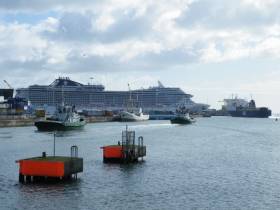Displaying items by tag: Code for Cruise & Ferry Ports
#Cruise&FerryCode - It was at the European Sea Ports Organisation (ESPO) recently held in Dublin, that the Code of Good Practices for Cruise and Ferry Ports was launched.
The code which is available (here to download) has been developed by ESPO together with Cruise Europe (see conference report) Cruise Baltic, Cruise Norway, MedCruise and Cruise Britain. The organisations have since September 2014 been part of the Cruise and Ferry Port Network.
The aim of the code is to formulate a series of good practices (also as a download) to face the challenges that European cruise and ferry ports are dealing with nowadays.
The five main challenges identified are the port-city relationship, infrastructure, cooperation, relation with the cruise and ferry lines and security. Besides sharing these practices among port authorities, the code can also be seen as an instrument to enhance the dialogue with all stakeholders involved in the cruise and ferry sector. Moreover, this code must inform policy makers and the wider public about the characteristics, challenges and bottom-up initiatives taken by European port authorities.
The code comes with a dynamic online inventory of concrete examples of the good practices outlined in the code. This inventory will be updated continuously and will turn the code into a living document.
Stavros Hatzakos, Chairman of the Cruise and Ferry Network said.“It is an honour to present this first outcome of the Cruise and Ferry Port Network. The cruise and ferry business is an important activity in European ports. Next to the 3.8 billion tonnes of goods that are passing through European ports each year, there are more than 400 million people passing through these same ports. The making of this code has shown the network to be a unique node of knowledge and of exchange of good practices at the service of every port in Europe that wants to improve its performance in the cruise and ferry business and for every port, who is a newcomer in the business.”
Isabelle Ryckbost, ESPO Secretary General added “Even if many ports in Europe are handling both freight and passengers, we see that passenger handling ports demand a specific approach in many areas: be it in infrastructure, where it is important to develop the right “look and feel” for your port; or in the relations with the city where the seasonality of passenger traffic obliges the port to work closely with the city to reduce externalities; or as regards security, where the port wants to ensure a high level of security while being customer friendly. The code also shows how a continuous dialogue with the lines and with the wide range of stakeholders involved in the business can enhance performance and improve the image of the sector”.
























































